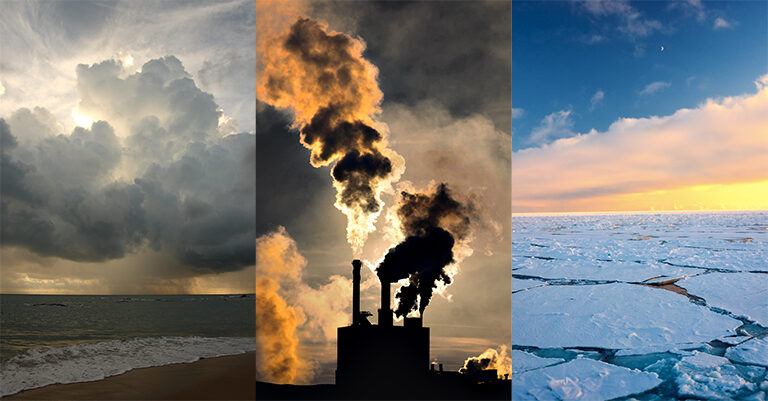On the 20th of October 2021 I attended the virtual IFIAD annual conference. The theme for this years conference was "A Year of Action: Food and Climate". There was a number of guest speakers and panellists discussing ideas and issues surrounding food security, agriculture, sustainable development and climate change following the Food Systems Summit and in the lead up to the highly anticipated COP26 Conference.
Key Issues Raised at the Conference.
1. Worldwide Food Security Issues.
The conference highlighted the severity of the worldwide food security crisis which actually got worse in 2020 due to the COVID-19 pandemic as seen in Image 1 below presented by Maximo Torero Cullen. From Image 2 we can see that one of the main action areas from the Food Systems Summit was to address food security issue through the nourishment of all people. Maximo Torero Cullen also suggested that food insecurity can at least be reduced through coalitions such as "A Coalition for Achieving Zero Hunger" and through Member State Pathway for example Ireland's Food Vision 2030 which aims to "produce food which is safe, nutritious and appealing, trusted and valued at home and abroad" (Department of Agriculture, Food and the Marine, 2021). Maximo Torero Cullen and Minister Pippa Hacket highlighted this as very important for food security worldwide.
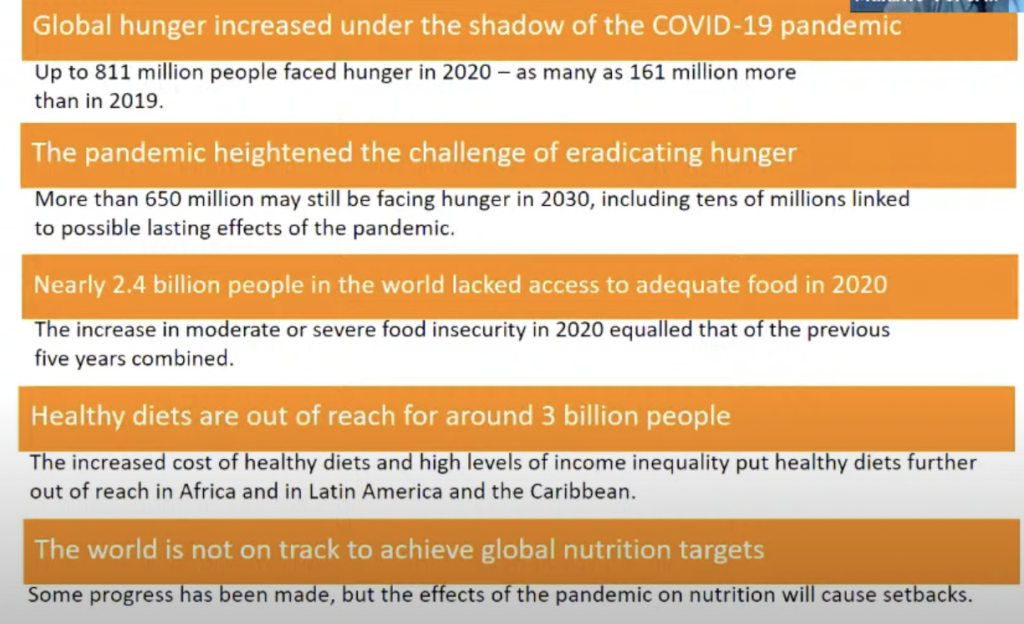
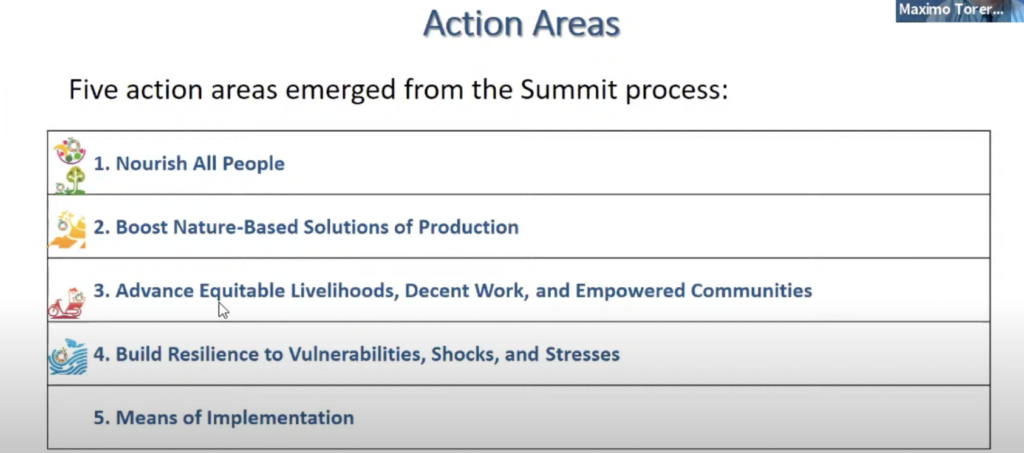
2. GHG Emissions.
In the opening statement Charles Spillane highlighted that in 2021 alone greenhouse gas emissions (GHG's) reached a new high resulting from human environmental impacts. He also highlighted that globally we are 40% off meeting emission reduction targets by 2030 set out in the Paris Agreement which will result in us not meeting the goal of keeping global warming below 1.5 degrees Celsius. However this issue seemed to be highlighted in every speakers point. Mark Howden looked at temperature changes and what influences them and from Image 3 below we can see temperature change affected by humans sees a larger increase than temperature change coming from natural sources. Mark also mentions how GHG concentrations are the highest in which they have been in years which is also being influenced by humans. These increasing GHG's concentrations and worldwide temperatures are altering earth's systems and bring changing climates as well as sea level rise, glacial retreat, reduction in the Artic Sea ice area and extreme weather events (such as storms, droughts and cyclones to name but a few). Image 3 below was presented by Maximo Torero Cullen and shows the problems the world faces today with one of the issues being the stresses in which agricultural systems are being put under due to global warming. Emission reduction in the Irish food-agri sector was a key issue here. One of the main aims of Irelands Food Vision 2030 was to produce "a climate-smart environmentally sustainable agri-food sector" which will obviously be very important for emissions reduction if achieved (Department of Agriculture, Food and the Marine, 2021).

Source: IPCC, 2021.
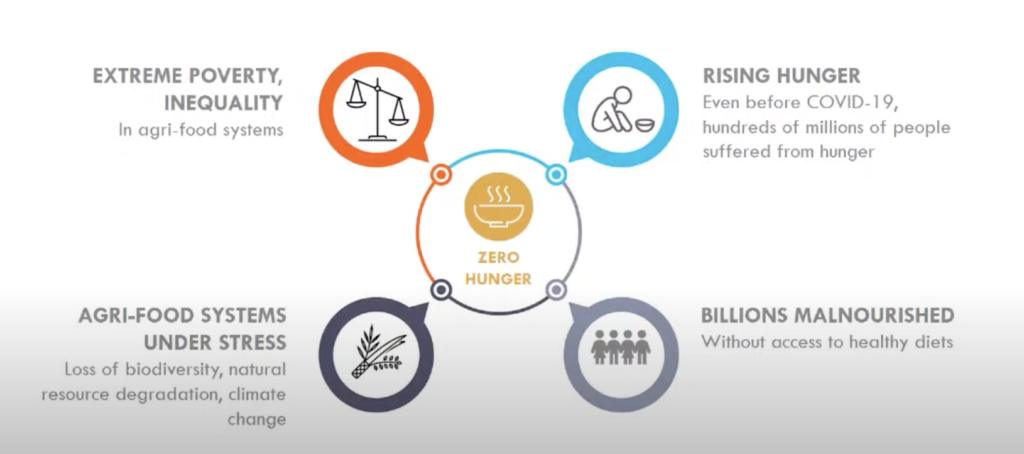
3. Agricultural Adaption
I believe another key issue which was raised and disscussed at the conference was the need for agricultural and food systems to build resistance and to adapt to the changing climate in order to try and tackle the first two issues mentioned above. As we can see from Image 2 actions areas two, four and five which were first established at the Food Systems Summit highlight this need for adaption. From the few commitments shown in Image 4 below which were made at the Food Systems Summit we can also see different methods of adaption emerging. In terms of the Irish Agricultural Sector and adaption, two of the goals ("Viable and resilient primary producers with enhanced well being" and "An innovative, competitive and resilient agri-food sector, driven by technology and talent") under Irelands Food Vision 2030 highlights our progress towards adaption (Department of Agriculture, Food and the Marine, 2021). However, how will agriculture adapt to the changing climate but also adapt to reduce GHG emissions and improve worldwide food security ? Mark Howden suggested adaption methods such as improved on-farm management, reducing post-harvest losses, reducing food waste, dietary changes and more sustainable land-use.
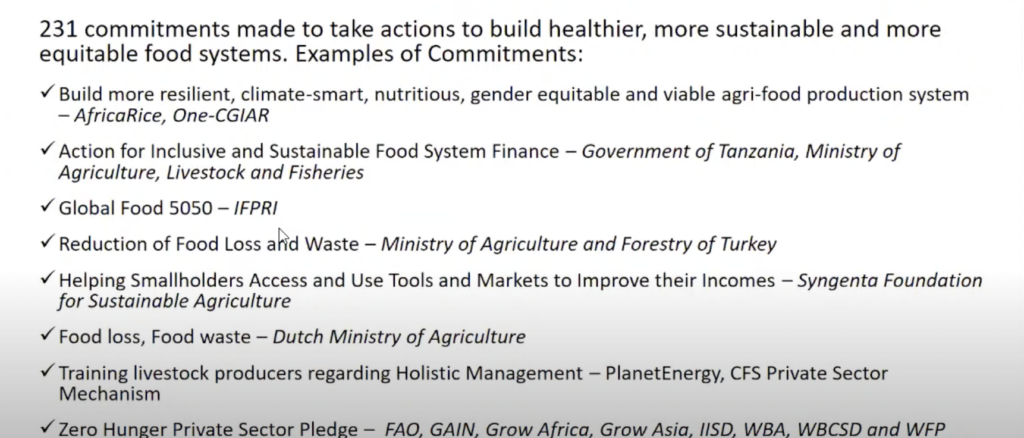
4. The Need for All Stakeholders to be Involved in Talks and Decision Making.
One of the main aims of both COP26 and the Food Systems Summit was to include all stakeholders (from the government and policy makers right down to the consumer) in the discussions and talks about climate mitigation and adaption. This means that the farmers who are practicing the adaption and mitigation plans need to be included in the talks. However, this rarely seems to happen. All speakers at the conference seem to be in agreement about this but at COP26 and The Food Systems Summit negotiations no farmers are actually included in the talks and instead it's mainly decision makers and people from the research and development backgrounds that are asked to the negotiation table. Even at the conference there was no farmer involved in the discussions. I believe farmers need to be included in talks in order to get their opinions on adaption and mitigation plans across before plans are put in place.
Areas of Polarisation and Lack of Consensus Identified at the Conference.
- Dietary Changes.
As mentioned above one of the ways Mark Howden suggested to reduce GHG emissions and prevent global warming is through dietary changes. According to Tilman and Clark 2014, Willett, Rockström et al., 2019 and Swinburn, Kraak et al. 2019 different feedstuffs produce different GHG footprints. According to Magkos, Tetens et al. 2019 moving to a plant based diet will bring environmental benefits as well as being a healthier, more affordable and reliable source of food for the population which in turn should bring a positive outlook on food security. However, this causes a huge divide among the population with some opting for the change while others completely against it. I believe a divide usually comes about between people who don't see the need/want to reduce their intake of animal based produce while others have no problem and see it as their duty in order to reduce their carbon footprint. This debate has gone on for years but, as much as people don't want to admit it, its clear that this change in diet will generate a positive affect on the environment as we can see in Image 5 below where 58% of our food emissions are coming from animal products so the consumption of less meats will reduce these emissions and also reduce the overall emissions coming from food.
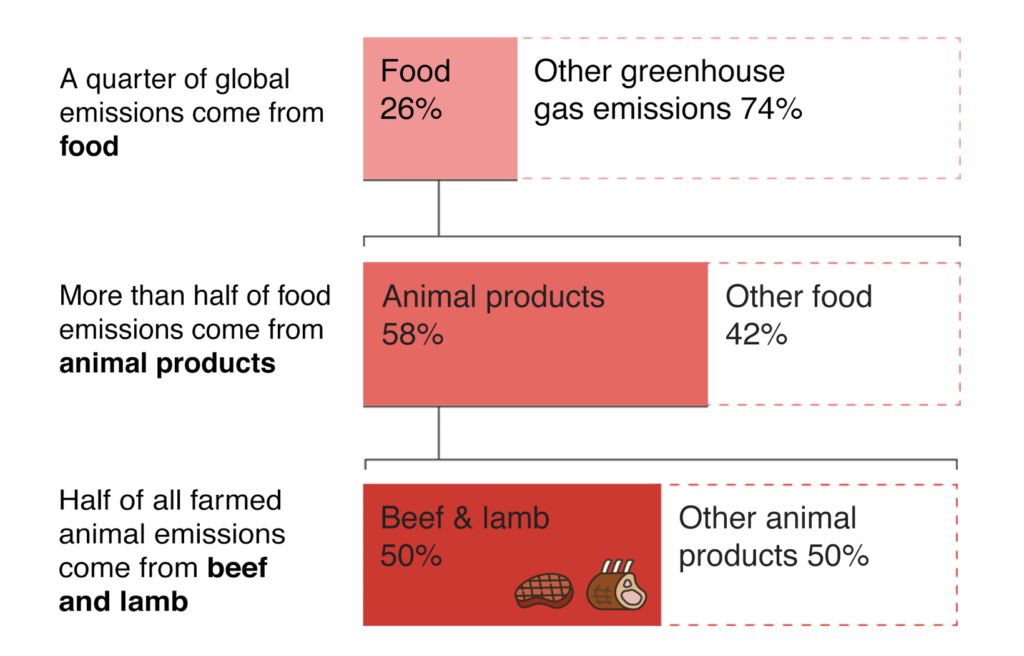
Source: Poore and Nemecek, 2018.
2. What are farmers to do ?
At the conference they're seemed to be a lack of consensus for farmers who need to alter they're production systems in order to make them more sustainable. I also thought there was a lack of consensus for the likes of beef and dairy producers who actually make a living from the production of animal based products. As discussed above there is a huge understandable push to move to a more plant based diet however, what does this actually mean for the food producers who make a living from this and what does it mean for countries where the beef and dairy industry contribute to a large proportion of the economy. Mark Howden did discuss ways in which we can reduce GHG's in agriculture as mentioned above but, these were very broad and no real examples were given to do this. As well as that there was no discussion around what farmers who may well lose their livelihoods as a result of the dietary change should do or what their options are in the future. Therefore, there needs to be support in forms of both advice and finance in order to help farmers in these situations become either more sustainable or look into future more climate friendly farming options.
Key Issues from Food Systems Summit and COP26 that weren't discussed at conference.
- Supports.
One of the main aims hoping to come out of the talks of COP26 is to scale up finance and support (UN Climate Change Conference UK, 2021). This I believe is a key component for agricultural sustainability, adaption and mitigation as without finance and support farmers may not know what to do? From talking to farmers in my local area about climate change I really question whether farmers actually know what is going on and how agriculture is affecting global footprints. They also don't know who to ask for support in terms of advice and finance and without this how will farmers ever adapt if they don't know how to ? It's constantly mentioned that climate change is a key issue and that it needs to be addressed now before it gets worse. However, this lack of urgency is missing throughout all of society from the government down to the consumer. They seem to talk about the problems and what they are and offer some solutions but no real solution is actually put in place and this is where the supports and finance need to come in to play and really be addressed at COP26 in order to see some positive changes.
2. Follow-Up Reviews.
One of the visions of the food system summit was to ensure there is a follow-up review done in each country to allow for new actions and results and share experiences, lessons and knowledge and incorporate new metrics for the impact analysis (UN Food Systems Summit, 2021). I think this is important because the follow up ensures that goals must be met and that the suggestions that came from both the Food Systems Summit and COP-26 aren't just brushed to the side but instead are being took on and implemented in order to meet the targets of the follow-up. It also means countries can look at other countries progress and learn and develop from what worked and didn't work for particular countries and ensures countries are working together and learning from each other to try and tackle the problem.
Bibliography
Department of Agriculture, Food and the Marine (2021). Food Vision 2030: A World Leader in Sustainable Food Systems. Government of Ireland.
IPCC, 2021. Climate Change 2021: The Physical Science Basis. Contribution of Working Group I to the Sixth Assessment Report of the Intergovernmental Panel on Climate Change. Cambridge University Press.
Magkos, F., I. Tetens, S. G. Bügel, C. Felby, S. R. Schacht, J. O. Hill, E. Ravussin and A. Astrup (2019). "A Perspective on the Transition to Plant-Based Diets: a Diet Change May Attenuate Climate Change, but Can It Also Attenuate Obesity and Chronic Disease Risk?" Advances in Nutrition 11(1): 1-9.
Poore, J. and T. Nemecek (2018). "Reducing food’s environmental impacts through producers and consumers." Science 360(6392): 987-992.
Swinburn, B. A., V. I. Kraak, S. Allender, V. J. Atkins, P. I. Baker, J. R. Bogard, H. Brinsden, A. Calvillo, O. De Schutter, R. Devarajan, M. Ezzati, S. Friel, S. Goenka, R. A. Hammond, G. Hastings, C. Hawkes, M. Herrero, P. S. Hovmand, M. Howden, L. M. Jaacks, A. B. Kapetanaki, M. Kasman, H. V. Kuhnlein, S. K. Kumanyika, B. Larijani, T. Lobstein, M. W. Long, V. K. R. Matsudo, S. D. H. Mills, G. Morgan, A. Morshed, P. M. Nece, A. Pan, D. W. Patterson, G. Sacks, M. Shekar, G. L. Simmons, W. Smit, A. Tootee, S. Vandevijvere, W. E. Waterlander, L. Wolfenden and W. H. Dietz (2019). "The Global Syndemic of Obesity, Undernutrition, and Climate Change: The Lancet Commission report." The Lancet 393(10173): 791-846.
Tilman, D. and M. Clark (2014). "Global diets link environmental sustainability and human health." Nature515(7528): 518-522.
UN Climate Change Conference UK (2021). Negotiations. https://ukcop26.org/uk-presidency/negotiations/. Accessed on 25/10/2021.
UN Food Systems Summit (2021). Summit Vision. https://www.un.org/en/food-systems-summit/vision-principles. Accessed on 25/10/2021.
Willett, W., J. Rockström, B. Loken, M. Springmann, T. Lang, S. Vermeulen, T. Garnett, D. Tilman, F. DeClerck, A. Wood, M. Jonell, M. Clark, L. J. Gordon, J. Fanzo, C. Hawkes, R. Zurayk, J. A. Rivera, W. De Vries, L. Majele Sibanda, A. Afshin, A. Chaudhary, M. Herrero, R. Agustina, F. Branca, A. Lartey, S. Fan, B. Crona, E. Fox, V. Bignet, M. Troell, T. Lindahl, S. Singh, S. E. Cornell, K. Srinath Reddy, S. Narain, S. Nishtar and C. J. L. Murray (2019). "Food in the Anthropocene: the EAT–Lancet Commission on healthy diets from sustainable food systems." The Lancet 393(10170): 447-492.
